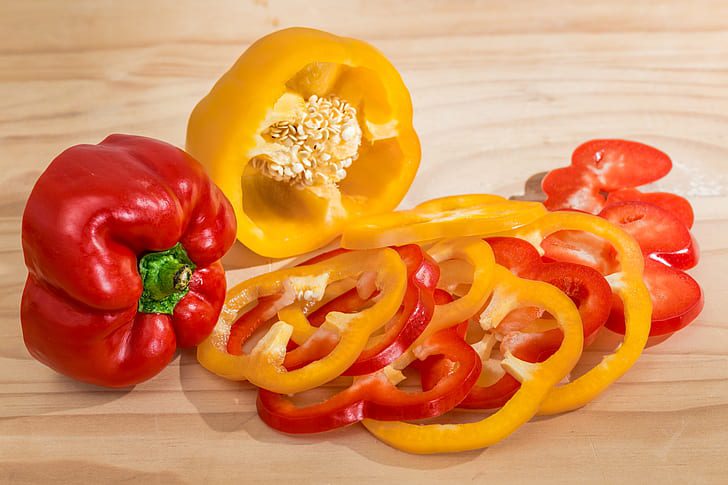As pet owners, we are always looking for new ways to keep our furry friends healthy and happy.
One question that comes up frequently is whether or not certain human foods are safe for dogs to eat.
Bell peppers are a common vegetable that many of us enjoy eating, but can dogs share this snack with us?
In this article, we will delve into whether or not dogs can eat bell peppers, their nutritional benefits, and any potential risks to keep in mind.
So, if you’re curious about whether or not bell peppers make a good addition to your dog’s diet, read on!
- Can Dogs Eat Bell Peppers?
- How Much Bell Peppers Can Dogs Eat?
- How Often Can Dogs Eat Bell Peppers
- Health Benefits of Bell Peppers To Dogs
- Potential Risks of Feeding Bell Peppers To Dogs
- Nutritional Benefits of Bell Peppers For Dogs
- Are Dogs Sensitive To Bell Peppers?
- How To Prepare Bell Peppers For Dogs
- How Fast Will Dogs Digest Bell Peppers
- FAQs
- In Conclusion
Can Dogs Eat Bell Peppers?

Yes, dogs can eat raw or cooked bell peppers and they are actually a healthy snack for them! Bell peppers come in a variety of colors, but red bell peppers are the most beneficial for your pup.
Red bell peppers contain high levels of vitamins A, C, and E, and antioxidants that help boost your dog’s health.
They are also low in calories and have a refreshing crunch that many dogs enjoy. Just make sure to avoid other varieties of green peppers like jalapeños and serrano peppers as they can be too spicy for your pup.
See also: 47 Safe Vegetables To Feed Your Dog. Puppy Power!
How Much Bell Peppers Can Dogs Eat?

While bell peppers are generally safe for dogs to eat, it’s important to remember that they should only be fed to your pup in moderation.
Too much of anything can upset their digestive system and cause stomach problems.
As a general rule of thumb, dogs should be given small amounts of bell peppers as an occasional treat, not as a regular part of their diet.
The number of bell peppers you should give your dog will depend on its size, age, and individual health needs.
A good starting point is to give your dog a few small pieces of bell pepper and observe how they react to it. If they show no signs of a negative reaction, you can add it to their diet in moderation.
Remember, moderation is key when it comes to feeding your dog human food, and you should always consult with your veterinarian before making any significant changes to your pup’s diet.
Bell Peppers Feeding Chart According To Size
| Food | Size | Portion |
|---|---|---|
| Bell Peppers | Toy dogs | Few slices |
| Bell Peppers | Small dogs | Few slices |
| Bell Peppers | Medium dogs | Half a bell pepper |
| Bell Peppers | Large Dogs | One bell pepper |
Bell Peppers Feeding Chart According To Age
| Food | Age | Portion |
|---|---|---|
| Bell Peppers | 0 – 6 months | Don’t feed |
| Bell Peppers | 6 – 12 months | Few slices |
| Bell Peppers | 12 – 24 months | Half a bell pepper |
| Bell Peppers | 24+ months | One bell pepper |
How Often Can Dogs Eat Bell Peppers
While bell peppers are generally safe for dogs to eat, they should be given in moderation and as an occasional treat.
It’s recommended that you consult with your veterinarian before adding any new human food to your dog’s diet to ensure that it’s safe and appropriate for them.
Additionally, it’s important to remember that dogs have different nutritional requirements than humans, which means that bell peppers should not be a regular part of their diet.
As a rule of thumb, treats should make up no more than 10% of a dog’s diet, and it’s best to stick with foods that are specifically formulated for pets.
Offering your dog a few small pieces of bell pepper once or twice a week, fully cooked and unseasoned, can be a healthy way to add some variety to their diet.
Keep in mind that if your dog has any digestive issues after eating bell peppers or any other human food, you should discontinue feeding it to them and consult with your veterinarian.
Monitoring your dog’s reaction to new foods is important to ensure that they remain healthy and happy.
Health Benefits of Bell Peppers To Dogs
- Rich in Nutrients. Bell peppers are rich in important nutrients that dogs need to thrive. They are a good source of fiber, vitamin A, vitamin C, vitamin E, and antioxidants. These nutrients are essential for a healthy immune system, healthy skin and coat, and overall well-being.
- Low in Calories. Bell peppers are low in calories, making them an ideal snack for dogs who are watching their weight. They are also less dense than other treats, so you can feed your pup a larger quantity without worrying about overfeeding.
- Healthy Eyesight. Bell peppers are rich in vitamin A, which is essential for maintaining good eyesight. This vitamin helps protect the cornea and other structures in the eye, supports night vision, and can help reduce the risk of age-related eye disorders.
- Promotes Digestive Health. Bell peppers are a great source of fiber, which helps promote healthy digestion. A high-fiber diet can help prevent constipation, diarrhea, and other digestive issues, and may even reduce the risk of certain digestive disorders.
- Anti-Inflammatory. Bell peppers contain antioxidants that help reduce inflammation in the body. Chronic inflammation can lead to a range of health problems, so adding anti-inflammatory foods like bell peppers to your dog’s diet can have a positive impact on their overall health and well-being.
Potential Risks of Feeding Bell Peppers To Dogs
- Choking Hazard. Bell peppers can be a choking hazard if not cut into small pieces or cooked until they are soft. Be sure to remove the seeds and stem, and cut the peppers into bite-sized pieces to prevent choking.
- Pesticide Residue. Bell peppers are often treated with pesticides, which can be harmful to both humans and dogs if ingested in large quantities. It’s important to wash bell peppers thoroughly before feeding them to your pup to reduce the risk of pesticide residue.
- Nutrient Imbalances. While bell peppers do contain important nutrients, feeding them in excess can cause a nutrient imbalance in your dog’s diet. Dogs have different nutritional requirements than humans, so it’s important to ensure that they are receiving a balanced diet that is specifically formulated for their needs. Feeding too many bell peppers may interfere with your dog’s ability to absorb other nutrients they need.
Nutritional Benefits of Bell Peppers For Dogs
| Bell Peppers Nutrition Facts per 100 grams | % DV * |
|---|---|
| Calories | 20 |
| Total Fat | 0.2 g |
| Cholesterol | 0 mg |
| Sugar | 2.4 g |
| Glycemic Index | 15 |
| Sodium | 3 mg |
| Carbs | 4.6 g |
| Protein | 0.9 g |
| Vitamin D | 0% |
| Calcium | 1% |
| Iron | 1% |
| Potassium | 175 mg |
Are Dogs Sensitive To Bell Peppers?
While bell peppers are generally safe for dogs to eat, some dogs may be sensitive or allergic to them.
The symptoms of bell pepper sensitivity can range from mild to severe and may include:
- Digestive issues such as vomiting, diarrhea, or excessive gas
- Skin irritation or itching, hives, or rash
- Respiratory problems such as coughing or wheezing, in rare cases
- Swelling of the mouth, lips, or tongue
If your dog displays any of these symptoms after consuming bell peppers or any other human food, it’s important to discontinue feeding them and consult with your veterinarian.
They can help identify the cause of the sensitivity or allergic reaction and recommend the appropriate treatment.
How To Prepare Bell Peppers For Dogs
- Raw. One easy way to prepare bell peppers for your dog is to serve them raw. Simply remove the stem and seeds and cut the pepper into bite-sized pieces. You can mix these pieces with your dog’s regular food to add some variety and crunch to their meal.
- Cooked. You can also cook bell peppers for your dog by steaming or boiling them until they are soft. Cooked peppers can be easier on your dog’s digestive system and are a good option if your dog has trouble digesting raw food. Just make sure not to add any seasonings or oils that could be harmful to your pup.
- Frozen. Another way to prepare bell peppers for your dog is to freeze them. This is a great option for hot summer days as the frozen peppers will provide a refreshing treat for your furry friend. Simply slice the peppers into bite-sized pieces and freeze them in an airtight container. Make sure to remove any seeds or stems before freezing.
How Fast Will Dogs Digest Bell Peppers
The digestion time for bell peppers in dogs can vary depending on the dog’s size and overall health, as well as their individual digestive system. In general, when fed in moderation, bell peppers are typically easily digested by dogs.
The digestion process begins as soon as the food enters the dog’s mouth, where it is mashed up with saliva and broken down into smaller particles.
These small particles then move into the dog’s stomach, where they are further broken down by digestive enzymes and acid. This process can take up to four hours.
The further the food moves along into the dog’s system, the more nutrients are absorbed by the body.
Minerals such as calcium, potassium, magnesium, and iron, and vitamins such as A, C, and E would be absorbed from the bell pepper.
The undigested parts of the peppers pass through the colon and out of the body as waste.
If your dog has difficulty digesting certain foods, it’s important to consult with your veterinarian to ensure that it’s safe to add bell peppers to their diet.
Keep in mind that moderation is key when it comes to feeding human food to dogs, and should only be done in limited quantities to prevent any digestive upset or other health issues.
FAQs
Can dogs eat bell peppers seeds?
Yes, dogs can eat bell pepper seeds, but it is not recommended. Bell pepper seeds are a choking hazard and can cause gastrointestinal discomfort if swallowed whole. Additionally, many bell pepper varieties have an outer coating that could potentially be toxic to dogs if ingested in large quantities.
In Conclusion
In conclusion, bell peppers are generally safe for dogs to eat in moderation, and can provide a range of health benefits such as supporting healthy digestion, promoting healthy skin and coat, and supporting normal eyesight.
However, while bell peppers are not toxic to dogs, they are not necessarily suitable for all dogs, especially if they have any digestive issues or allergies.





Leave a Reply